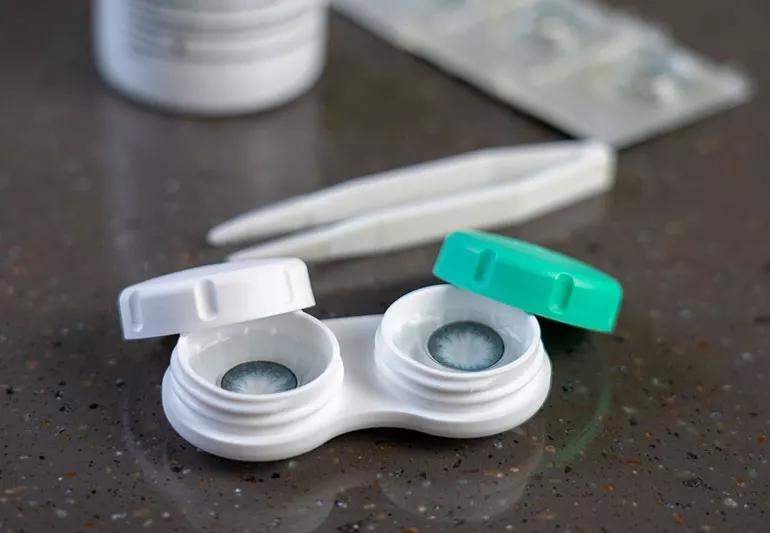For starters, don’t sleep in contact lenses

Image content: This image is available to view online.
View image online (https://assets.clevelandclinic.org/transform/3dd6c6f6-4554-4fba-bb6a-ff37d8358c49/contactCare-1171324391-770x533-1_jpg)
contact case with contacts inside
No one wants an eye infection from contacts. If you’ve ever slept in your contact lenses, worn disposable lenses past the prescribed replacement schedule, or gone for a dip in the community pool without removing contacts from your eyes first, it’s time to rethink your habits.
Advertisement
Cleveland Clinic is a non-profit academic medical center. Advertising on our site helps support our mission. We do not endorse non-Cleveland Clinic products or services. Policy
Why? Because poor choices can lead to serious infections (like a contact lens eye infection, ouch!) in some cases, says optometrist Reecha Kampani, OD.
About 80% to 90% of contact lens-related eye infections are bacterial. Many involve a common and tough-to-treat bacteria known as staphylococcus aureus.
But the most severe may be pseudomonas aeruginosa, a fast-growing bacterial infection that can lead to a hole in your cornea. Unfortunately, patients who get this infection have a high chance of permanent scarring and vision loss.
Beyond bacteria, fungal infections such as aspergillus or fusariam are also potentially threats to your vision. Sometimes they are caused by trauma to the eye, but poor contact lens hygiene can lead to these fungal infections, too.
The good news: You can usually avoid these health problems (and contact lens infection) by knowing what to watch for and by practicing good habits.
Signs of an eye infection include red, painful eyes, watering or discharge, light sensitivity, blurred vision or the sensation that a foreign body is in your eye. These can come from bacteria in your eye from your contacts.
If you have these symptoms, get checked out by a doctor immediately. Your vision is too important to risk long-term damage from an infection.
Advertisement
Whenever she fits patients for contact lenses, Dr. Kampani shares the rule of the three “S’s”: don’t sleep, swim or shower in your lenses.
The second two “S’s” apply to water. Water may contain pathogens or pollutants that cause the infections outlined above, so be careful not to get any in your eye — especially while wearing contacts.
Swimming presents specific problems. Pools, lakes and even hot tubs may harbor bacteria and microbes that can produce a serious infection, such as acanthamoeba keratitis, which is caused by a free-swimming amoeba. This type of infection can cause visual impairment or even blindness.
First, don’t wear lenses beyond their recommended, replacement schedule. Secondly, do not sleep in lenses.
“One of the biggest problems with over-wearing or sleeping in the lenses is you’re getting less oxygen to the eye,” Dr. Kampani says. “This can lead to infection, inflammation and abrasions to the eye because the added oxidative stress makes the eye more vulnerable to various bacteria and pathogens.”
If you wear soft contact lenses, pay special attention. These lenses create the ideal condition for pathogens to grow, like a petri dish. Daily disposable soft lenses have helped reduce the risk of complications, but healthy habits are still extremely important.
Some people tend to reuse their cleaning and storage solution. Or they “top it off” instead of adding fresh solution to their lens cases every day. The minor savings you get from this are not worth a potential infection.
Throw out your solution and start fresh daily. And be sure to replace lens cases once every three months, too, Dr. Kampani says. Using a case for too long can add to pathogen buildup.
Storing contact lenses in a hydrogen peroxide-based solution is an efficient way to reduce bacteria. These solutions, available in stores, are especially effective at cleaning lenses, Dr. Kampani says.
Various brands may have different directions for soaking the lenses, so be sure to check labels. Usually the recommendation is to store the lenses in the solution for at least four to six hours. It’s safe enough to use every day. Make sure you do not put the solution directly into the eye, or rinse the lenses without the proper supplied case.
Advertisement

Sign up for our Health Essentials emails for expert guidance on nutrition, fitness, sleep, skin care and more.
Learn more about our editorial process.
Advertisement
Allergic reactions and overprocessing are just a couple things to keep an eye out for
Eye drops and cold water rinses can help speed up healing for viral and allergen-related conjunctivitis, but a bacterial infection will need antibiotics
Eye crusts can signal an infection or your body’s natural self-cleaning at work
Irritated eyes are just the beginning if you leave your contacts in too long
Contact lenses are available for virtually every prescription and lifestyle
Even contacts made for overnight use can hurt your eyes
The short answer from an ophthalmologist
The short answer from an optometrist
Type 2 diabetes isn’t inevitable with these dietary changes
Applying a hot or cold compress can help with pain
Pump up your iron intake with foods like tuna, tofu and turkey